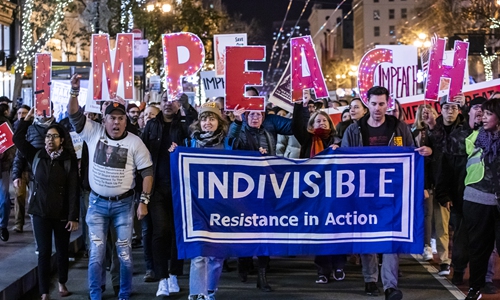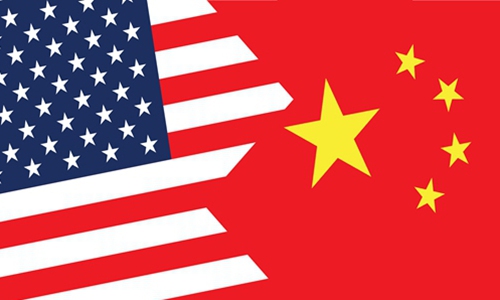HOME >> CHINA
Impeachment could impact China-US ties
By Yang Sheng Source:Global Times Published: 2019/12/18 23:53:40 Last Updated: 2019/12/19 0:45:48

Hundreds of protesters march down Market Street during a demonstration as part of a national impeachment rally, at the Federal Building in San Francisco on Tuesday. Protesters participated in "Nobody is Above the Law" rallies on the eve of a historic Trump impeachment vote in the US House of Representatives. Photo: AFP
US President Donald Trump is facing increasing domestic pressure as the Democrat-dominated House of Representatives is scheduled to vote on his impeachment Wednesday, and this might add more uncertainties to China-US relations in 2020, the US presidential election year, since the Trump administration could be more aggressive and tougher on policymaking toward China.Chinese analysts believe that whether Trump gets re-elected or not, China-US relations will not return to the pre-2019 situation, as the year is a turning point to a new normal - less cooperation and more friction and confrontation in bilateral relations.
They also suggested that China should actively shape and manage the most important bilateral relationship in the world by focusing on self-development and reform to ensure the US accepts China's increasing influence rather than recklessly provoking and containing China that will increase the risk of conflicts.
The looming House vote to impeach Trump is likely to pass, but would also likely unite Republicans in backing Trump to ensure his re-election. How it would impact remains a question, said An Gang, a US studies expert and senior research fellow at the Pangoal Institution, a Beijing-based think tank.
"Due to the domestic scandals and pressure, Trump would be more motivated to focus on foreign affairs, and the impact on China is that the Trump administration will try its best to maximize what it can get from the trade deal, and will be more hawkish and even aggressive on matters, including Hong Kong, Taiwan and Xinjiang to show 'political correctness' to its supporters."
In 2019, friction and confrontations between China and the US surged. The US sent more warships to provoke China's sovereignty in the South China Sea and through the Taiwan Straits.
Several acts were passed in Congress to interfere in China's domestic affairs including Xinjiang, Hong Kong and Taiwan. A trade war and unfair treatment of Chinese companies such as Huawei brought damage to both sides despite a phase one deal to at least stop imposing more tariffs on each other.
Ni Feng, director-general of the Institute of American Studies at the Chinese Academy of Social Sciences in Beijing, told the Global Times that what happened in 2019 has made more people realize that the China-US relationship could worsen, and that there was no reversing this trend no matter who wins next year's US presidential election.

Photo: VCG
Potential risksThe agreement to the text of the phase one deal is a positive sign for both sides to at least "stop the bleeding" for their economies, but divergences remain and negotiations for the next round won't be easy, Chinese experts noted, adding that due to the lack of credibility and unreliable image of the Trump administration, China can't be too optimistic.
China will surely be a hot topic in the presidential election, and it is probable that US politicians will hype the China threat theory and launch more offensives in many fields, Ni said.
An said US trade bullying and other provocative acts have forced China to fight back, which is also seriously influencing Chinese public opinion toward the US.
Da Wei, director of the Beijing-based China Institutes of Contemporary International Relations' Institute of the American Studies, said that the US used to believe the Chinese young generation and middle class will share more common ideas with the US on the development of China.
Recent incidents, such as the NBA row caused by the Houston Rockets' manager's tweet on Hong Kong, made it clear that at least on topics related to national interests, territorial integrity and sovereignty, Chinese youth, the urban middle class and private business owners hold very different opinions from the US, Da said.
A Pew Research Center report in August said US views on China turned sharply negative amid trade tensions.
"Today, 60 percent of Americans have an unfavorable opinion of China, up from 47 percent in 2018 - the highest level since Pew Research Center began asking the question."
Cooperation needed
The US Department of State said Tuesday that US Special Representative for North Korea Stephen Biegun will travel to Beijing December 19-20 to meet Chinese officials to discuss "the need to maintain international unity on North Korea."
China and Russia on Tuesday also put forward a draft resolution on the political settlement of the Korean Peninsula to the UN Security Council to urge Washington and Pyongyang to have dialogue and proposed lifting some sanctions on North Korea in light of the country's compliance with relevant UN Security Council resolutions. On Saturday, North Korea said through its national news agency KCNA that "a very important test took place at the Sohae Satellite Launching Ground."
Ni said China and the US still have common ground on the denuclearization of the Korean Peninsula so both sides need to cooperate on this to balance the confrontations in other aspects.
Be prepared
Most Chinese analysts agree that regardless of who wins in the US elections, there is no chance for China-US ties to return to the pre-2019 situation, as China's growing influence and comprehensive development, as well as its will to reform and influence globalization and the world order, are making the US nervous, and at the same time there is no reason for China to give up its development.
Greater competition is unavoidable and China should be prepared, said experts, suggesting that China should shape the future of China-US relations by managing the confrontations and preventing an escalation of conflicts, and focusing on self-development and reform, and be more confident to open itself to the outside world and share its development with other members of the international community. One day, the US will accept the reality and find a new way to co-exist with China, analysts said.
Posted in: DIPLOMACY